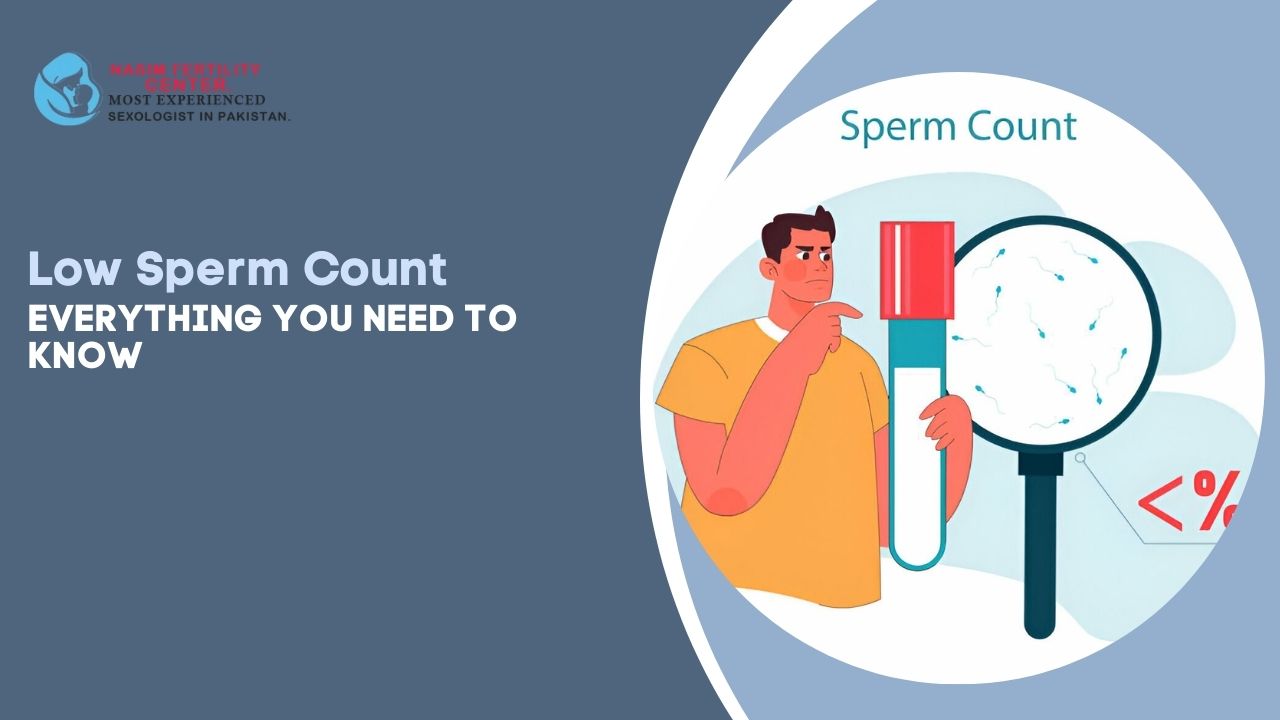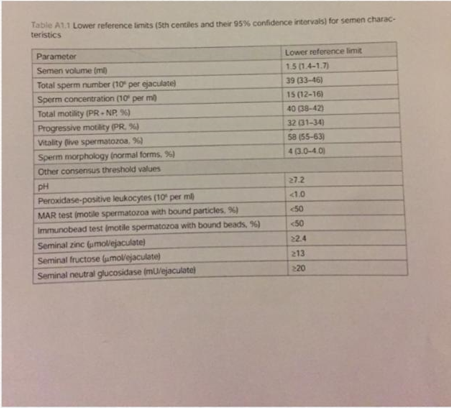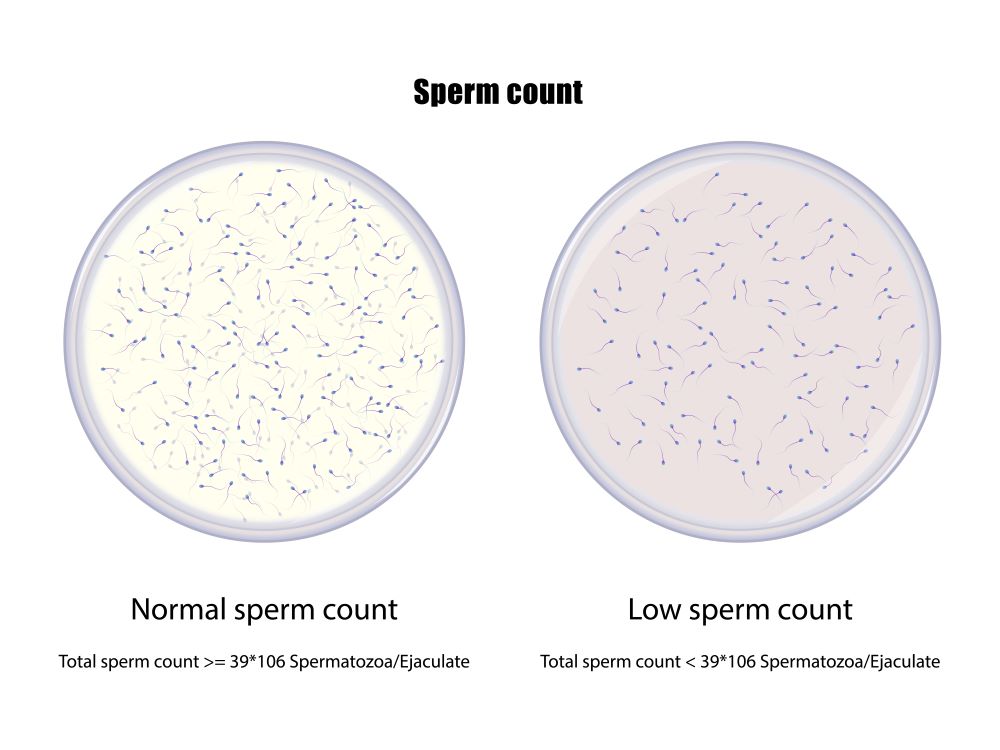
Male fertility is a significant aspect of reproductive health, and sperm count plays a crucial role in this. Understanding what constitutes a normal sperm count, why it matters, and how it affects fertility can help men take better care of their reproductive health.
Dr. Farooq Nasim Bhatti, a renowned sexologist and spermatorrhea expert in Pakistan, brings his 31 years of experience to shed light on this important topic. With clinics in Lahore, Islamabad, Faisalabad, and the convenience of online consultations, Dr. Bhatti has been helping men across Pakistan understand and improve their sperm health.
What is Sperm Count and Normal Sperm Count?

Sperm count refers to the number of sperm present in a given volume of semen, typically measured in millions per milliliter (ml). According to the “WHO laboratory manual for the Examination and processing of human semen – 5th Edition,” a normal sperm concentration is at least 15 million sperm per ml.
- Total Count / Sperm Concentration: At least 15 million per ml
- Total Motility: 40% or more
- Progressive Motility: 32% or more
- Vitality (Live Spermatozoa): 58% or more
- Sperm Morphology (Normal Forms): 4% or more
Why Does Sperm Count Matter?
Sperm count is a key indicator of male fertility. A higher sperm count increases the likelihood of one of the sperm reaching and fertilizing the egg, leading to pregnancy. A low sperm count can make this process more difficult, reducing the chances of natural conception.
How Does Sperm Count Affect Fertility?
Fertility largely depends on the ability of the sperm to reach and fertilize an egg. Here’s how sperm count influences this process:
- Higher Sperm Count: More sperm means a better chance of one reaching the egg.
- Motility: Sperm need to swim effectively to reach the egg, so higher motility percentages are crucial.
- Morphology: The shape and structure of sperm affect their ability to penetrate the egg.
- Vitality: Live sperm are essential for fertilization; dead or immobile sperm cannot contribute to conception.
Low sperm count ki wajah se fertility issues ka samna hai?
Dr. Farooq Nasim Bhatti, Pakistan ke leading male infertility specialist, se advanced aur confidential treatment hasil karein — apni family ki umeed ko haqiqat banayein.

Are There Treatments for Low Sperm Count?
Yes, various treatments can help improve sperm count and overall fertility:
- Medications: Hormonal treatments can address imbalances that affect sperm production.
- Surgery: Procedures to correct issues like varicocele can improve sperm count.
- Assisted Reproductive Techniques (ART): Methods like IUI treatments and IVF can help in cases of low sperm count.
- Lifestyle Changes: Diet, exercise, and avoiding harmful substances can improve sperm health.
Also Read: Can Stress Cause Erectile Dysfunction
Improving Sperm Count
In addition to seeking medical treatment, there are several lifestyle changes you can make to help improve your sperm count:
- Maintain a healthy weight: Obesity has been linked to lower sperm counts and poorer sperm quality.
- Quit smoking and reduce alcohol consumption: Smoking and excessive alcohol use can negatively impact sperm production and function.
- Manage stress: Chronic stress can interfere with the hormonal balance necessary for optimal sperm production.
- Ensure adequate vitamin and mineral intake: Nutrients like vitamin C, vitamin E, zinc, and folate are essential for sperm health.
- Avoid exposure to toxins: Certain chemicals, pesticides, and heavy metals can damage sperm and reduce sperm count.
Additional Semen Analysis Aspects
In addition to sperm count, other factors analyzed in a semen test include:
- Total Motility: The percentage of moving sperm.
- Progressive Motility: The percentage of sperm moving forward.
- Vitality: The percentage of live sperm.
- Morphology: The percentage of sperm with normal shape.
Low Sperm Count and High Sperm Count

- Low Sperm Count (Oligospermia): Defined as fewer than 15 million sperm per ml.
- High Sperm Count: Generally considered beneficial, but extremely high counts can sometimes indicate underlying issues.
A low sperm count, also known as oligospermia, is defined as less than 15 million sperm per ml. This can significantly impact fertility, but it does not necessarily mean that conception is impossible. In some cases, men with low sperm counts may still be able to father a child, especially with the help of assisted reproductive technologies.
On the other hand, a high sperm count, or hyperspermia, is defined as more than 200 million sperm per ml. While a high sperm count is generally not a cause for concern, it is important to rule out any underlying medical conditions that may be contributing to it.
Expert Sexologist in Pakistan for your Sperm Count Issues
If you are concerned about your sperm count or overall reproductive health, it is recommended to seek the guidance of an experienced sexologist in Pakistan like Dr. Farooq Nasim Bhatti. With his 31 years of expertise, Dr. Farooq Nasim Bhatti MBBS, FAACS (USA), Diplomate of the American board of Sexology (USA), CST, HSC (Hong Kong), CART (MALAYSIA), CART (CHINA), has helped countless patients in Pakistan address a wide range of sexual health issues, including fertility-related concerns.
Dr. Farooq Nasim Bhatti’s clinics in Lahore, Islamabad, and Faisalabad, as well as his online consultation services and he also offers online appointments as a best sexologist in Peshawar, provide a comprehensive approach to evaluating and treating male infertility. He can perform a thorough semen analysis, identify any underlying causes, and develop a personalized treatment plan to help you optimize your sperm health and improve your chances of conception.
Conclusion
Understanding sperm count and its impact on fertility is essential for men looking to improve their reproductive health. With the right information and expert guidance from professionals like Dr. Farooq Nasim Bhatti, men can take proactive steps to boost their sperm count and overall fertility. Whether through medical treatments, lifestyle changes, or both, improving sperm health is within reach.
Frequently Asked Questions
What is a normal sperm count?
A normal sperm count is at least 15 million sperm per ml, according to the WHO guidelines.
Can low sperm count be treated?
Yes, low sperm count can be treated with medications, surgery, assisted reproductive techniques, and lifestyle changes.
How does diet affect sperm count?
A healthy diet rich in antioxidants, vitamins, and minerals can significantly improve sperm count and quality.
Is stress linked to low sperm count?
Yes, high stress levels can negatively impact sperm production and quality.
How can I improve my sperm count naturally?
Regular exercise, a healthy diet, stress management, and avoiding toxins can help improve sperm count naturally.
For more information or to schedule a consultation, visit Dr. Farooq Nasim Bhatti’s clinics in Lahore, Islamabad, Faisalabad, or opt for an online consultation to receive expert care from the comfort of your home.
Disclaimer
This information is for educational purposes and not the treatment. For treatment, you need to consult the doctor.

Dr. Farooq Nasim Bhatti (MBBS, FAACS – USA, Diplomate: American Board of Sexology, CST, HSC – Hong Kong, CART – Malaysia & China) is a qualified medical sexologist with 30+ years of experience. He has presented 21+ research papers internationally and treats sexual dysfunction through sex therapy, counseling, and pharmacotherapy to restore natural sexual function without temporary medication.

Regain Confidence with Our ED Solutions
Explore effective treatments for erectile dysfunction. Take charge of your intimacy today.


